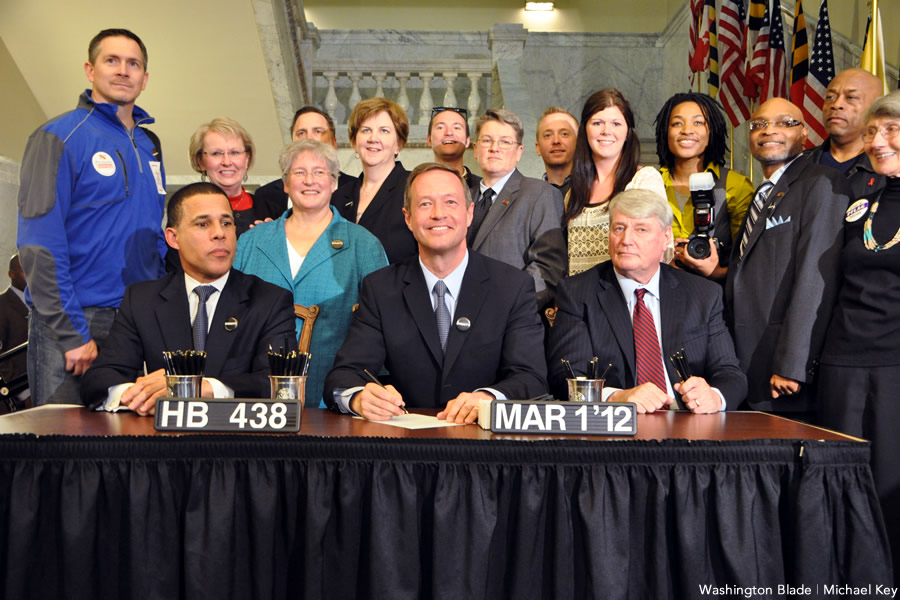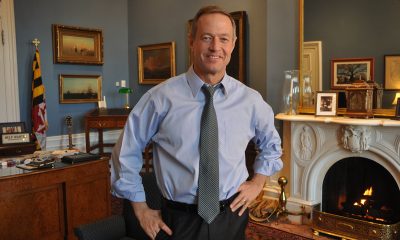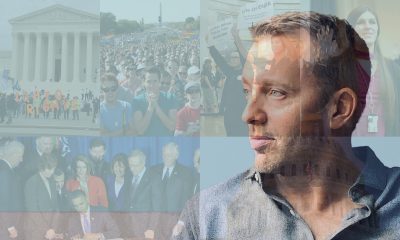Arts & Entertainment
Anatomy of a victory
Behind the scenes of the Maryland marriage battle
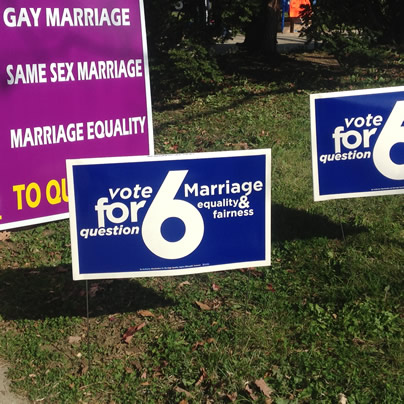
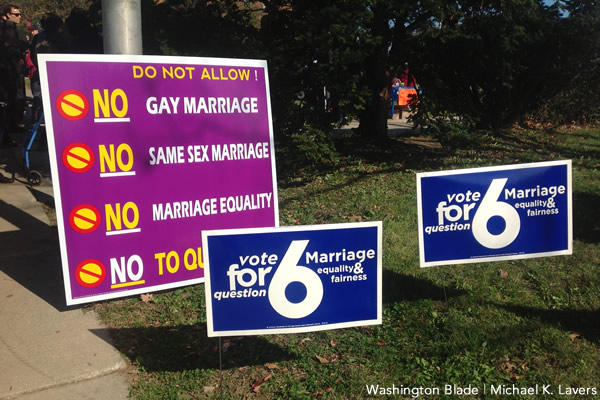
Question 6 supporters and opponents placed signs outside Northwood Elementary School in Baltimore on Nov. 6. (Washington Blade photo by Michael K. Lavers)
Edgewater, Md., residents Adri Eathorne and Kim-May Hinken arrived at Anne Arundel Medical Center in Annapolis to visit their friend, Scott Bowling, shortly before the polls closed at 8 p.m. on Election Day. The three of them nervously awaited the results of the referendum on Maryland’s same-sex marriage law as the slowly began to trickle in.
More than four hours later, they learned Question 6 had narrowly passed.
“We closed his hospital room door,” Eathorne, who has been with Hinken nine years, says. “We closed his hospital room door so we could [yell] ‘Yeah!’ and high-five each other and hug and kiss and cry.”
The passage of Question 6 by a 52-48 percent margin on Nov. 6 capped off an anxious night of waiting for the hundreds of people and dozens of reporters who had gathered at the Baltimore Soundstage.
One of Gov. Martin O’Malley’s staffers wrote on a napkin during lunch on Election Day that the referendum would pass with 53 percent support. Congressman Elijah Cummings made the same prediction during an interview with the Washington Blade earlier in the day outside a Northeast Baltimore polling place at which the governor, Baltimore Mayor Stephanie Rawlings-Blake and Brendon Ayanbadejo of the Baltimore Ravens greeted voters.
“I had a pretty good sense as we were heading into Election Day that it was going to hold,” O’Malley said in a Blade interview this week. “I had a pretty good sense in the course of those last 10 days that it was on a good positive trajectory.”
Josh Levin, campaign manager for Marylanders for Marriage Equality, was backstage with the governor, Rawlings-Blake and several other elected officials watching the results come in. President Obama had already won re-election by the time Politico reported shortly before midnight that Question 6 had passed with 84 percent of precincts reporting.
Levin and others remained hesitant to declare victory because Montgomery County had yet to report election results. (Question 6 passed in the county by a 65-35 percent margin.)
“Once we figured that out then I started breathing a little more deeply,” O’Malley says. “Then when the Montgomery County numbers came in and we were up to 51 [percent,] the night seemed to be coming into perspective. We were very reluctant to claim a victory of course until we had enough of the numbers in.”
Levin last week, while cleaning out Marylanders for Marriage Equality’s Baltimore office, says Question 6 was leading throughout the night.
“We watched it grow to 45,000 votes or so,” he says. “It shrank at one point to about 12,000. But right around midnight we felt like we had a pretty good sense of where things were. And so I went back to talk through what still could happen, what’s still out, where do we think that’s coming from and made the decision to go up on stage and declare victory from there.”
“There was confidence once the results started to come in,” says gay state Sen. Rich Madaleno (D-Montgomery County.) “There was confidence all night long, it’s just a matter of when do you say it. And because we had never won before, there’s no desire to jinx yourself. I think you’re more cautious than you would have ever been.”
The Washington Post projected Question 6 had passed just as O’Malley, Rawlings-Blake, Levin and others took to the stage to declare victory. Those gathered inside the Baltimore Soundstage became euphoric when lesbian state Del. Maggie McIntosh (D-Baltimore City) announced the referendum had passed. People began to cry. Gay state Dels. Luke Clippinger (D-Baltimore City) and Heather Mizeur (D-Montgomery County) were among those who started dancing once the governor and other dignitaries stepped away from the podium.
O’Malley instrumental in fundraising
Election Day capped off a long and often tumultuous effort for Maryland’s same-sex marriage advocates that began in 1997 when three state lawmakers introduced the first bill that would have allowed nuptials for gays and lesbians.
Equality Maryland, which nearly closed in June 2011, and the American Civil Liberties Union in 2004 filed a lawsuit on behalf of Lisa Polyak and Gita Deane and eight other same-sex couples and a gay widow who sought the right to marry in the state. The Maryland Court of Appeals in 2007 ultimately upheld the constitutionality of the state’s ban on marriage for gays and lesbians.
State lawmakers in 2011 narrowly defeated a same-sex marriage bill, but legislators approved it in February. O’Malley signed the law on March 1.
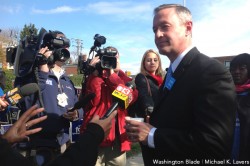
Governor Martin O’Malley speaks to reporters outside Northwood Elementary School in Baltimore on Nov. 6. (Washington Blade photo by Michael K. Lavers)
The governor soon emerged as the law’s most prominent supporter, especially after the Maryland Marriage Alliance collected more than 160,000 signatures to force a referendum on the issue. Marylanders for Marriage Equality turned to O’Malley, among others, in early August to help bolster their then-anemic fundraising efforts.
“We found ourselves in a situation where polling looked good, we felt good about what we were building, but we simply weren’t bringing in money at the rate that we needed to,” Levin says. “We as a campaign and with our board members we sort of rang the bell a little bit and talked to the governor, got Maggie McIntosh more involved. The ACLU redoubled their efforts. And I think brought to bear all the efforts that helped us [reach] the financial goals that we needed to.”
Levin said in June his group could effectively defend the law with between $5-$7 million, in spite of some observers who said Marylanders for Marriage Equality needed to raise up to $12 million.
O’Malley headlined a star-studded fundraiser gay former Republican National Committee Chair Ken Mehlman co-hosted at a New York City hotel in September that raised more than $100,000 for the pro-Question 6 group. The governor also appeared at an Oct. 2 fundraiser with D.C. Mayor Vincent Gray and House Minority Whip Steny Hoyer (D-Md.) at gay Democratic lobbyist Steve Elmendorf’s Logan Circle home. Former National Football League Commissioner Paul Tagliabue and his wife Chan announced a $100,000 donation to Marylanders for Marriage Equality during the fundraiser that Chip DiPaula, Jr., former Gov. Bob Ehrlich, Jr.’s gay chief-of-staff, attended alongside Mizeur and others.
The Human Rights Campaign contributed more than $1.5 million in cash and in-kind contributions to the pro-Question 6 campaign. Freedom to Marry, which initially declined to join the coalition defending the state’s same-sex marriage law, said it invested more than $200,000 into the campaign. This figure includes the $70,000 it gave that helped Marylanders for Maryland Equality air their radio ad highlighting President Obama’s support of marriage rights for same-sex couples in the days leading up to Election Day.
“HRC provided so much of the backbone to this whole effort,” Madaleno says. “They were absolutely critical.”
Marylanders for Marriage Equality ultimately raised $6 million — they consistently outraised the Maryland Marriage Alliance throughout the Question 6 campaign. The ACLU and other organized labor groups contributed more than $1 million to Marylanders for Marriage Equality.
New York City Mayor Michael Bloomberg and Republican hedge fund manager Paul Singer both donated $250,000 to the pro-Question 6 campaign. The bulk of the 11,000 people who contributed to Marylanders for Marriage Equality, however, live in Maryland.
“We proved from going to the state that nobody thought could win to being the second-widest margin after Maine among the four is pretty cool,” Levin says. “And I want to really say the team that was here through the legislative campaign that figured out, that believed in doing Maryland when nobody else did — the leadership of folks like Sultan [Shakir] and Kevin [Nix], Rich Madaleno and Luke Clippinger and all the others.”
One of the proudest moments of the campaign for Levin came when Marylanders for Marriage Equality was able to counter a Maryland Marriage Alliance television ad that claimed Question 6 would force schools to teach same-sex marriage with their own ad eight hours later that featured Baltimore County teacher Pamela Gaddy. Levin showed it to McIntosh, HRC President Chad Griffin, former O’Malley adviser Joe Bryce and his wife Kristen and a handful of others shortly after he arrived at a campaign fundraiser at DiPaula’s home before he put it on the air on Oct. 26.
“We were ready and able to do it that fast, versus the stories that so many other folks who worked in California [on the campaign against Proposition 8] told just having to figure it out there,” Levin says. “The lessons they learned they gave us and we applied. And we took a Maryland angle on it, putting up an African-American, Baltimore-area schoolteacher to just go, ‘That’s not true, you know.’ When we looked at it a week later, their argument wasn’t resonating. People just weren’t buying it, according to our research.”
Obama, NAACP endorsements key
O’Malley, Levin and Mizeur all noted Obama’s public support of marriage rights for gays and lesbians and his endorsement of the same-sex marriage law garnered additional support among black Marylanders.
In addition to the radio ad featuring the president, Marylanders for Marriage Equality also sent a mailing that contained his and first lady Michelle Obama’s statements in support of marriage rights for same-sex couples to 200,000 African-American households in the state. (Baltimore Black Pride co-chair Meredith Moise was handing out these fliers on Election Day as she spoke with voters outside a polling place at a Northeast Baltimore elementary school.)
“It was important that we echoed their support,” Levin says.
The NAACP’s support of Question 6 and particularly television ads that featured Julian Bond, the civil rights organization’s chair emeritus, and Revs. Delman Coates of Mount Ennon Baptist Church in Clinton and Donté Hickman of Southern Baptist Church in Baltimore appear to have resonated with voters in the predominantly black Charm City.
Question 6 passed by a 57-43 percent margin in Baltimore City. It lost by slightly more than 4,300 votes in Prince George’s County.
A Public Policy Polling survey in May found 55 percent of black Marylanders would vote for the law, compared to 36 percent who said they would oppose it. A Hart Research Associates survey conducted in late July found 44 percent of African-American voters would support Question 6, compared to 45 percent who said they would vote against it. A Gonzales Research poll in September noted 44 percent of black Marylanders backed marriage rights for same-sex couples, compared to 52 percent who oppose nuptials for gays and lesbians. An Associated Press exit poll indicates roughly half of black Maryland voters voted against Question 6.
Maryland Marriage Alliance Chair Derek McCoy, Bishop Harry Jackson, Jr., of Hope Christian Church in Beltsville and others who opposed the law repeatedly criticized and even mocked the NAACP, Obama, Coates, Hickman and other prominent black leaders who backed marriage rights for same-sex couples in the state. Some Question 6 opponents resorted to increasingly homophobic rhetoric during appearances at black churches and other public forums in the weeks leading up to Election Day. Pastor Luke Robinson of Quinn Chapel AME Church in Frederick even suggested during a sparsely attended rally against the same-sex marriage law at a city park on Nov. 4 that Superstorm Sandy struck New York City less than three weeks after Bloomberg donated $250,000 to Marylanders for Marriage Equality.
“It pretty clearly was having an effect,” Levin says. “I don’t think the other guys would have been bringing it up as often if it hadn’t been.”
The Maryland State Conference of the NAACP and the organization’s Prince George’s County and Baltimore branches in particular factored prominently in the pro-Question 6 campaign.
Bob Ross, president of the Prince George’s County Branch of the NAACP, organized phone banks and canvassing efforts ahead of Election Day. He also spoke about his gay brother who had lived in the closet for years during a Nov. 5 rally at the University of Maryland in College Park that O’Malley, Hoyer, Madaleno, state Sen. Allan Kittleman (R-Carroll and Howard Counties) and others attended.
“Surely we need to recognize not only the importance of their endorsement, but the amount of work that they did,” Levin says.
Couples busy planning weddings
With all the behind-the-scenes work that led to the passage of Question 6, the only thing that matters to those who plan to take advantage of the law once it officially takes effect on Jan. 1 is the fact they can legally marry the person they love.
“It was kind of like, ‘Oh my God, what are we doing about our wedding plans?’” says ShaDonna Jackson, a Hyattsville, Md., resident who plans to wed her partner of nearly four years, Latisha Smith. “We needed absolute certainty because it’s a serious matter. It’s like, ‘Oh my goodness everything depends on this, so we need to know.’ And now that we know, we are back to our wedding plans.”
Eathorne and Hinken, who chairs the annual Chesapeake Pride Festival, are planning to get married in Annapolis on the first day same-sex couples can legally marry in the state.
“We’ve waited so long for it to be legal in our home state that we really wanted to do it as soon as possible,” Eathorne says (they had a church wedding in 2007). Hinken also spoke in support of the same-sex marriage bill in front of the State House in Annapolis. “We just want to make that statement. And that’s one of the reasons why we want it to be ASAP. We’ve been together for nine years. We don’t need a big full-blown wedding. We had our thing. It is special and we do plan to acknowledge it and celebrate it in some way.”
Madaleno, who once again proposed to his husband Mark on stage at the Baltimore Soundstage after Question 6 passed, plans to have what he describes as their “renewal of vows” once they and their two children return from a family vacation at Walt Disney World in Florida in January. The couple married 11 years ago at their Bethesda church, but Madaleno said having the legal recognition will make it even more official.
“What will be different,” he says, “is we’re getting a license.”

Friday, Feb. 20
Center Aging Monthly Luncheon with Yoga will be at noon at the D.C. LGBTQ+ Community Center. Email Mac at [email protected] if you require ASL interpreter assistance, have any dietary restrictions, or questions about this event.
Trans and Genderqueer Game Night will be at 7 p.m. at the D.C. Center. This will be a relaxing, laid-back evening of games and fun. All are welcome! We’ll have card and board games on hand. Feel free to bring your own games to share. For more details, visit the Center’s website.
Go Gay DC will host “First Friday LGBTQ+ Community Social” at 7 p.m. at Hotel Zena. This is a chance to relax, make new friends, and enjoy happy hour specials at this classic retro venue. Attendance is free and more details are available on Eventbrite.
Saturday, Feb. 21
Go Gay DC will host “LGBTQ+ Community Brunch” at 11 a.m. at Freddie’s Beach Bar & Restaurant. This fun weekly event brings the DMV area LGBTQ community, including allies, together for delicious food and conversation. Attendance is free and more details are available on Eventbrite.
LGBTQ People of Color will be at 7 p.m. on Zoom. This peer support group is an outlet for LGBTQ People of Color to come together and talk about anything affecting them in a space that strives to be safe and judgement free. There are all sorts of activities like watching movies, poetry events, storytelling, and just hanging out with others. For more information and events, visit thedccenter.org/poc or facebook.com/centerpoc.
Sunday, Feb. 22
Queer Talk DC will host “The Black Gay Flea Market” at 1 p.m. at Doubles in Petworth. There will be more than 15 Black queer vendors from all over the DMV in one spot. The event’s organizers have reserved the large back patio for all vendors, and the speak easy for bar service, which will be serving curated cocktails made just for the event (cash bar.) DJ Fay and DJ Jam 2x will be spinning the entire event. For more details, visit Eventbrite.
Monday, Feb. 23
“Center Aging: Monday Coffee Klatch” will be at 10 a.m. on Zoom. This is a social hour for older LGBTQ adults. Guests are encouraged to bring a beverage of choice. For more information, contact Adam at [email protected].
Tuesday, Feb. 24
Coming Out Discussion Group will be at 7 p.m. on Zoom. This is a safe space to share experiences about coming out and discuss topics as it relates to doing so — by sharing struggles and victories the group allows those newly coming out and who have been out for a while to learn from others. For more details, visit the group’s Facebook.
Genderqueer DC will be at 7 p.m. on Zoom. This is a support group for people who identify outside of the gender binary, whether you’re bigender, agender, genderfluid, or just know that you’re not 100 percent cis. For more details, visit genderqueerdc.org or Facebook.
Wednesday, Feb. 25
Job Club will be at 6 p.m. on Zoom upon request. This is a weekly job support program to help job entrants and seekers, including the long-term unemployed, improve self-confidence, motivation, resilience and productivity for effective job searches and networking — allowing participants to move away from being merely “applicants” toward being “candidates.” For more information, email [email protected] or visit thedccenter.org/careers.
Asexual and Aromantic Group will meet at 7 p.m. on Zoom. This is a space where people who are questioning this aspect of their identity or those who identify as asexual and/or aromantic can come together, share stories and experiences, and discuss various topics. For more details, email [email protected].
Thursday, Feb. 26
The DC Center’s Fresh Produce Program will be held all day at the DC Center. To be more fair with who is receiving boxes, the program is moving to a lottery system. People will be informed on Wednesday at 5 p.m. if they are picked to receive a produce box. No proof of residency or income is required. For more information, email [email protected] or call 202-682-2245.
Virtual Yoga Class will be at 7 p.m. on Zoom. This free weekly class is a combination of yoga, breathwork and meditation that allows LGBTQ community members to continue their healing journey with somatic and mindfulness practices. For more details, visit the DC Center’s website.
Sports
US wins Olympic gold medal in women’s hockey
Team captain Hilary Knight proposed to girlfriend on Wednesday

The U.S. women’s hockey team on Thursday won a gold medal at the Milan Cortina Winter Olympics.
Team USA defeated Canada 2-1 in overtime. The game took place a day after Team USA captain Hilary Knight proposed to her girlfriend, Brittany Bowe, an Olympic speed skater.
Cayla Barnes and Alex Carpenter — Knight’s teammates — are also LGBTQ. They are among the more than 40 openly LGBTQ athletes who are competing in the games.
The Olympics will end on Sunday.
Movies
Radical reframing highlights the ‘Wuthering’ highs and lows of a classic
Emerald Fennell’s cinematic vision elicits strong reactions

If you’re a fan of “Wuthering Heights” — Emily Brontë’s oft-filmed 1847 novel about a doomed romance on the Yorkshire moors — it’s a given you’re going to have opinions about any new adaptation that comes along, but in the case of filmmaker Emerald Fennell’s new cinematic vision of this venerable classic, they’re probably going to be strong ones.
It’s nothing new, really. Brontë’s book has elicited controversy since its first publication, when it sparked outrage among Victorian readers over its tragic tale of thwarted lovers locked into an obsessive quest for revenge against each other, and has continued to shock generations of readers with its depictions of emotional cruelty and violent abuse, its dysfunctional relationships, and its grim portrait of a deeply-embedded class structure which perpetuates misery at every level of the social hierarchy.
It’s no wonder, then, that Fennell’s adaptation — a true “fangirl” appreciation project distinguished by the radical sensibilities which the third-time director brings to the mix — has become a flash point for social commentators whose main exposure to the tale has been flavored by decades of watered-down, romanticized “reinventions,” almost all of which omit large portions of the novel to selectively shape what’s left into a period tearjerker about star-crossed love, often distancing themselves from the raw emotional core of the story by adhering to generic tropes of “gothic romance” and rarely doing justice to the complexity of its characters — or, for that matter, its author’s deeper intentions.
Fennell’s version doesn’t exactly break that pattern; she, too, elides much of the novel’s sprawling plot to focus on the twisted entanglement between Catherine Earnshaw (Margot Robbie), daughter of the now-impoverished master of the titular estate (Martin Clunes), and Heathcliff (Jacob Elordi), a lowborn child of unknown background origin that has been “adopted” by her father as a servant in the household. Both subjected to the whims of the elder Earnshaw’s violent temper, they form a bond of mutual support in childhood which evolves, as they come of age, into something more; yet regardless of her feelings for him, Cathy — whose future status and security are at risk — chooses to marry Edgar Linton (Shazad Latif), the financially secure new owner of a neighboring estate. Heathcliff, devastated by her betrayal, leaves for parts unknown, only to return a few years later with a mysteriously-obtained fortune. Imposing himself into Cathy’s comfortable-but-joyless matrimony, he rekindles their now-forbidden passion and they become entwined in a torrid affair — even as he openly courts Linton’s naive ward Isabella (Alison Oliver) and plots to destroy the entire household from within. One might almost say that these two are the poster couple for the phrase “it’s complicated.” and it’s probably needless to say things don’t go well for anybody involved.
While there is more than enough material in “Wuthering Heights” that might easily be labeled as “problematic” in our contemporary judgments — like the fact that it’s a love story between two childhood friends, essentially raised as siblings, which becomes codependent and poisons every other relationship in their lives — the controversy over Fennell’s version has coalesced less around the content than her casting choices. When the project was announced, she drew criticism over the decision to cast Robbie (who also produced the film) opposite the younger Elordi. In the end, the casting works — though the age gap might be mildly distracting for some, both actors deliver superb performances, and the chemistry they exude soon renders it irrelevant.
Another controversy, however, is less easily dispelled. Though we never learn his true ethnic background, Brontë’s original text describes Heathcliff as having the appearance of “a dark-skinned gipsy” with “black fire” in his eyes; the character has typically been played by distinctly “Anglo” men, and consequently, many modern observers have expressed disappointment (and in some cases, full-blown outrage) over Fennel’s choice to use Elordi instead of putting an actor of color for the part, especially given the contemporary filter which she clearly chose for her interpretation for the novel.
In fact, it’s that modernized perspective — a view of history informed by social criticism, economic politics, feminist insight, and a sexual candor that would have shocked the prim Victorian readers of Brontë’s novel — that turns Fennell’s visually striking adaptation into more than just a comfortably romanticized period costume drama. From her very opening scene — a public hanging in the village where the death throes of the dangling body elicit lurid glee from the eagerly-gathered crowd — she makes it oppressively clear that the 18th-century was not a pleasant time to live; the brutality of the era is a primal force in her vision of the story, from the harrowing abuse that forges its lovers’ codependent bond, to the rigidly maintained class structure that compels even those in the higher echelons — especially women — into a kind of slavery to the system, to the inequities that fuel disloyalty among the vulnerable simply to preserve their own tenuous place in the hierarchy. It’s a battle for survival, if not of the fittest then of the most ruthless.
At the same time, she applies a distinctly 21st-century attitude of “sex-positivity” to evoke the appeal of carnality, not just for its own sake but as a taste of freedom; she even uses it to reframe Heathcliff’s cruel torment of Isabella by implying a consensual dom/sub relationship between them, offering a fragment of agency to a character typically relegated to the role of victim. Most crucially, of course, it permits Fennell to openly depict the sexuality of Cathy and Heathcliff as an experience of transgressive joy — albeit a tormented one — made perhaps even more irresistible (for them and for us) by the sense of rebellion that comes along with it.
Finally, while this “Wuthering Heights” may not have been the one to finally allow Heathcliff’s ambiguous racial identity to come to the forefront, Fennell does employ some “color-blind” casting — Latif is mixed-race (white and Pakistani) and Hong Chau, understated but profound in the crucial role of Nelly, Cathy’s longtime “paid companion,” is of Vietnamese descent — to illuminate the added pressures of being an “other” in a world weighted in favor of sameness.
Does all this contemporary hindsight into the fabric of Brontë’s epic novel make for a quintessential “Wuthering Heights?” Even allowing that such a thing were possible, probably not. While it presents a stylishly crafted and thrillingly cinematic take on this complex classic, richly enhanced by a superb and adventurous cast, it’s not likely to satisfy anyone looking for a faithful rendition, nor does it reveal a new angle from which the “romance” at its center looks anything other than toxic — indeed, it almost fetishizes the dysfunction. Even without the thorny debate around Heathcliff’s racial identity, there’s plenty here to prompt purists and revisionists alike to find fault with Fennell’s approach.
Yet for those looking for a new window into to this perennial classic, and who are comfortable with the radical flourish for which Fennell is already known, it’s an engrossing and intellectually stimulating exploration of this iconic story in a way that exchanges comfortable familiarity for unpredictable chaos — and for cinema fans, that’s more than enough reason to give “Wuthering Heights” a chance.

